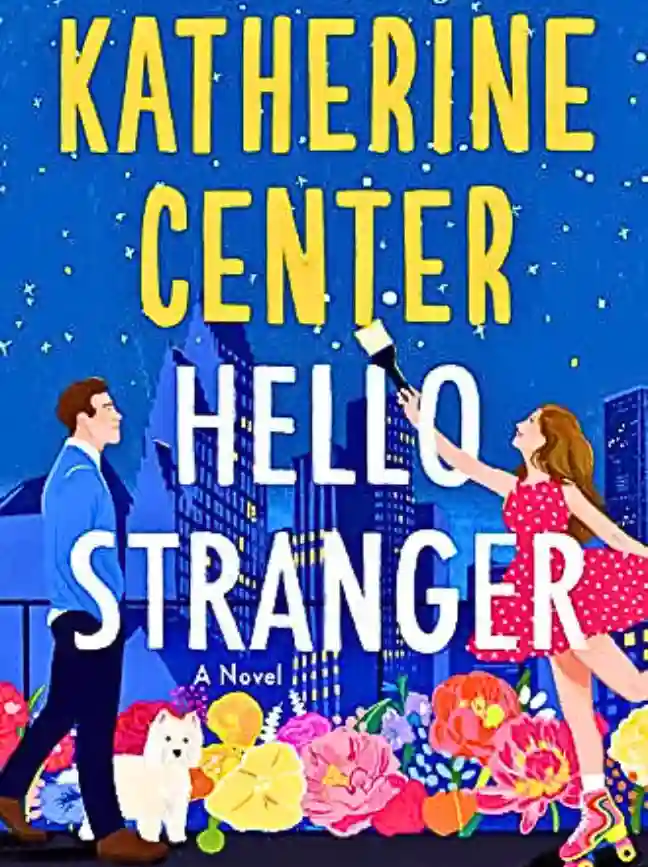The day after Christmas, Sam sent Sadie an email: Hello Stranger, I’ve played your game twice now, and I want to talk to you about it! Let’s get together when you’re back from the holidays. Say Hi to our old friend California for me.—S.A.M. P.S. I’m glad we ran into each other.
She did not immediately reply, the fact of which did not trouble Sam. In those days, a person might not be able to check her email when she was away from school.
By the middle of January, she still hadn’t replied, and he began to worry that his email hadn’t been received. He decided to send another.
While he waited for her response, he played Solution again. At that point, he had played through the game, alone, three times. The first time he played, he didn’t get any of the information, just went for points, and he received the rank of Grand Nazi Collaborator. The second time he played, he took all the information but still solved the levels as quickly as possible. He was given the rank of Facilitator. The last time he played, he received all the information and played the levels as slowly as he could while still leveling up. He received the rank of Conscientious Objector. Sam believed that Conscientious Objector was the best possible rank you could obtain in Solution, though he hadn’t gone into the code to confirm it.
As Sam played, he began to take notes on the game. He thought the game was clever, but he also thought there were small things she might improve. At the same time, there were other small things that had been done so well, he wanted to make sure she knew that he, at one time her best friend, had noticed her labors. He organized the micro feedback into a spreadsheet, with categories like sounds, delays, mechanics, prose,
graphics, pacing, HUD, controls, general ludic thoughts. He hadn’t decided if he would give her this file.
The thing he most wanted to talk to her about was the game on a macro level. His biggest note was that the game should have greater complexity. Solution, he felt, was fantastic as an academic exercise. But wouldn’t it be even better if you could open another part of the game if you chose the moral path. After a while, if you used your points for any of the information, the mystery was obvious and the game became repetitive. Wouldn’t it be better if those who played well enough and morally enough could figure out how to reroute the factory’s output? The simulation, Sam felt, was incomplete, and thus, not fully satisfying. The simulation was incomplete because it didn’t have a call to action. The only feeling a player could have at the end of Sadie’s game was nihilism. Sam fully got what she was trying to do, but he also believed that she would have to do more if she were to make games that people loved, not just games that people admired.
He felt excited when he was coming up with these thoughts for Sadie. He felt excited in a way he didn’t feel when he worked on “Alternative Approaches to the Banach-Tarski Paradox…” The words of Anders Larsson came back to him: “To be good at something is not quite the same as loving it.” After playing Solution, he knew what he would love (and what he thought he would be good at): he would love to make a game with Sadie Green. And as soon as she wrote back, he would convince her that this was what they should do.
Another week passed, and she still hadn’t replied. Harvard’s reading period was over; Sam had finished all his exams, and the new term was about to begin. Normally, Sam would have taken the hint and forgotten that he had ever encountered Sadie Green in the subway station. But Solution wouldn’t let him. She had given him the game for a reason, he felt, and he had to talk to her, even if it was for the last time. The Readme file contained her email address, but also a physical address (no phone number), which appeared to be an apartment on Columbia Street, equidistant between Kendall and Central Squares. This is to say, there was no easy way to get to Sadie’s apartment from the closest T stop. Sam would have to walk about a
quarter of a mile from the station, and that was difficult for him, with his cobbled-together left foot, on the icy, irregular streets of Cambridge, in the middle of winter. He considered taking a cab, but he couldn’t afford one. The weather was cold but fine, and he had no obligations, so he decided to brave the walk. He rarely used his cane—even though it was medically necessary, he felt it made him look affected, like a twenty-one-year-old Mr. Monopoly—but on this occasion he used it. This, he felt, was business.
He arrived at Sadie’s apartment, and he rang the bell. At the last second, he worried that it was an old address on Sadie’s Readme, and that he would have come all this way for nothing.
After about five minutes, a roommate answered. Sam said he was looking for Sadie, and the roommate looked suspiciously at Sam for a beat, before deciding he was harmless. “Sadie!” the roommate called. “There’s a kid out here to see you.”
Sadie emerged from her bedroom. It was two in the afternoon, and Sam could tell that he had woken her.
“Sam,” she said drowsily. “Hey.”
She looked un-showered. Her MIT sweatshirt had reddish and whitish stains on it. And even though the sweatshirt was baggy, he could tell that she was unusually thin underneath it. Her hair was matted and dirty, like an animal who had been in the wild a long time. She had—it must be said—an odor. Sam surmised that this wasn’t the result of one day of sleeping in.
“Are you okay?” Sam asked. Six weeks ago, she had appeared fine. “Sure,” Sadie said. “Why are you here?”
“I…” He was so momentarily disturbed by this Sadie, he forgot why he had come. “I tried to email you. I wanted to talk about Solution. Do you remember? You gave me the disk—”
Sadie interrupted him with a heavy sigh. “Listen, Sam, it’s not a good time.”
He was about to leave, but then he didn’t. “Could I—? I walked all this way from Central Square, and it would be great if I could sit down a minute.”
She looked at his cane and at his foot. “Come in,” she said wearily.
Sam followed Sadie into her bedroom. The curtains were drawn, and there were clothes and other detritus everywhere. This wasn’t like the Sadie he had known. He asked if something had happened.
“Why would you care? We aren’t real friends, remember?” Sadie met Sam’s gaze. “And it’s rude to not call before you show up at someone’s apartment.”
“I’m sorry. I didn’t have your number. And you weren’t emailing me back,” Sam said.
“I suppose I’ve fallen behind on my email correspondence, Samson.” Sadie got back into bed and put her head under the covers. “I need to get some sleep.” Her voice was muffled by the sheets. “Show yourself out.”
Sam moved some clothes off her desk chair, and he sat down on it. Without emerging from the blankets, she said, “That coat is ridiculous.”
A few seconds later, Sam could hear the regular sound of Sadie’s somnolent breathing.
Sam looked around Sadie’s room. There was a Duane Hanson “Tourists” poster above the bed, and a Hokusai wave over her dresser. Above the desk, he noticed a small, framed drawing. It was a maze, depicting the city of Los Angeles. The frame, a delicate carved bamboo, was listing to the left, so he straightened it. On the desk, he noticed a disk, with Sadie’s handwriting on it: EmilyBlaster. Sam put the disk in his coat pocket, and then he left.
—
The invitation had arrived in September, a month or so after Sam had found out about Sadie’s community service project and called her a cunt. Mr. Samson A. Masur, in calligraphy on the envelope. Sharyn Friedman-Green and Steven Green invite you to the Bat Mitzvah of their daughter, Sadie Miranda…Service at 10, followed by lunch…Your response requested…
The invitation was quite plain, which is to say, it was not obviously fancy. Heavy cream card stock, raised text, vellum-lined envelope. But Sam was old enough to have noticed that simple things were often the most
expensive. He held the invitation to his nose and he took a certain pleasure in the scent of fine paper. Sam didn’t think it smelled like money, because money was dirty. It smelled rich and clean, like a hardcover from a bookstore, like Sadie herself.
Sam set the invitation on the back of his desk and considered the envelope separately. The paper proved an irresistible temptation. He loosened its seams with steam from the tap and turned the envelope into a flat sheet of paper. He took out his favorite Staedtler Mars Lumograph pencil and began to draw a maze on the rescued paper. Sam did not always know what he was drawing when he began a maze, but this time, he found himself drawing a series of circles and curves, and these circles somehow became Los Angeles. The maze started on the Eastside, in Echo Park, where Sam lived, and ended on the Westside, in the Beverly Hills flats, where Sadie lived. It wound through West Hollywood, up the Hollywood hills to Studio City, back down the hills to East Hollywood, Los Feliz, and Silver Lake, before finally circling around to Koreatown and Mid-City. He grew so absorbed in drawing the maze that he didn’t even notice when Dong Hyun came into the room. It was late, and Dong Hyun smelled of pizza, as he usually did.
“That’s a good one,” Dong Hyun said. His hand reached toward the invitation on Sam’s desk: “May I?” Unlike Sam’s grandmother, Bong Cha, Dong Hyun always asked permission before touching Sam’s possessions.
Sam sighed. “If you must.”
“It is nice to be invited places,” Dong Hyun pronounced upon reading the invitation. He and Sam’s grandmother were worried about Sam’s mood since he’d stopped seeing Sadie. Sam wouldn’t tell them what had happened, aside from saying that she hadn’t been the person he thought she was.
Sam set down his pencil and looked at Dong Hyun. “I honestly don’t want to go. I don’t know any of Sadie’s friends.”
“You’re Sadie’s friend,” Dong Hyun said.
Sam shook his head, no. “She wasn’t. She was just being nice.”
Several weeks later, Sadie called Sam on the phone. They hadn’t spoken for two months, and her voice sounded high-pitched and strange. “My dad needs to know if you’re coming. You didn’t send back the response card.”
“I don’t know,” Sam said. “I might have something that day.”
“Well, could you let me know when you know? We need to plan the number of meals, or whatever,” Sadie said.
“Fine.”
“Sam, you can’t be mad at me forever.” Sam hung up the phone.
Bong Cha had spied on Sam’s phone call from the phone in the kitchen, and she returned the response card the next day in the affirmative. She bought Sam a new pair of khaki pants, a blue oxford shirt, a cotton necktie with flowers on it, and Bass loafers. She had been told by her other grandson, Albert, that this was what fourteen-year-old boys wore to fancy parties. The morning of the party, she presented Sam with the new clothes and informed him that he should get ready to go to the Bat Mitzvah.
“You shouldn’t have done that!” Sam yelled. “I’m not going!”
“But look, Sam, I made a present for Sadie.” Bong Cha opened a gift bag. She had had the maze that Sam had drawn from Sadie’s house to theirs framed and matted.
Sam banged his hand on the wall. “You had no right to do that! These are my private things! And Sadie doesn’t want a piece of crap like that!”
“But you were drawing it for her, weren’t you? It’s a very nice picture, Sam,” Bong Cha said. “I’m sure Sadie will like it so much.”
Sam picked up the frame and lifted it up high in the air. He was about to slam it on the floor when he changed his mind and set it down on the table instead.
Sam stalked up the stairs to his bedroom—he could not yet manage to run up stairs. He slammed the door.
After a bit, Dong Hyun knocked. “Your grandmother only wants to help,” he said. “She’s worried about you.”
“I don’t want to go,” Sam said. “Please don’t make me go.” He could feel that he might cry, and he was determined not to.
“Why?” Dong Hyun asked.
“I don’t know.” Sam was embarrassed to tell Dong Hyun that his only friend hadn’t been a friend at all.
“I don’t think your grandmother was right to do what she did,” Dong Hyun said. “But it is done now, and it may hurt Sadie’s feelings if you don’t go.”
“I don’t care if I hurt her feelings, and it won’t hurt them anyway. It’s a huge party. All her rich friends will be there, and her parents’ rich friends. She won’t even notice if I’m not there.”
“I think she will notice,” Dong Hyun said.
Sam shook his head. What did Dong Hyun know about life? “My foot hurts.” Sam never complained about his pain, and he knew that if he did, Dong Hyun wouldn’t pressure him to do anything. “It hurts all the time. I just can’t.”
Dong Hyun nodded. “If it’s okay with you, I’ll drop off the gift at the party. I think she will like the present you and your grandmother made.”
“Her parents can buy her anything she wants. Why would she want some dumb thing I drew on the back of an envelope?” Sam said.
“I suppose,” Dong Hyun said, “because her parents can buy her anything she wants.”
That Love is SHOOT
all there is SHOOT
is all we know of
Sam was about to shoot Love when Marx came into his room to ask him if he wanted to go to dinner. “What’s that?” Marx asked.
“It’s another one of my friend’s games. It’s not as good as Solution, but it’s still somewhat fun,” Sam reported.
Marx sat down next to Sam, and Sam handed him the keyboard so that he could play a round.
Because SHOOT
I could not SHOOT
stop for SHOOT
kindly
An ink pot combusted on the screen, indicating that Marx, having shot the wrong phrase, had lost a life. “This is the most violent poetry game I’ve ever played,” Marx said.
“You’ve played other poetry games?”
“Well, technically, no,” Marx said. “Your friend’s talented. And odd.”
Marx Watanabe and Sam were both born in 1974, making them a year older than most of the class of 1997. Marx had taken a gap year, working for his father’s investment firm; Sam, of course, had fallen back because of the time he’d spent in the hospital. They did not, at first glance, have a great deal in common, and in all likelihood, their shared birth year was the reason they had both been assigned to be freshman-year roommates.
The layout of Wigglesworth doubles was such that the room could either be set up as two singles, with one being a walk-through, or as a shared single, with a common area. Marx was quite social, and before he met Sam, he had been hoping to convince him to set up the room with the common area, which would be optimal for having company.
Sam had gotten to the room before Marx, and so Marx met Sam’s possessions before he met Sam: an aging desktop computer with a Doctor
Who sticker on one side and a Dungeons & Dragons sticker on the other; one large, travel-beaten, hard-sided, baby blue American Tourister suitcase (which would turn out to be filled with impractical lightweight clothes); a black cane; a small bamboo in a pot shaped like an elephant. The vibe Marx got was single.
When Sam finally returned to the room, Marx couldn’t help but smile. With his sweet, roundish face, light-colored eyes, and mix of white and Asian features, Sam looked almost exactly like an anime character. Astro Boy, or one of the many wisecracking little brothers of manga. As for his personal style: Sam looked like Oliver Twist, during the Artful Dodger years, if Oliver Twist had been from Southern California and a low-level pot dealer instead of a pickpocket. Sam had dark curly hair that he wore parted in the middle and bluntly cut, just above his shoulders. He wore cheap John Lennon–style wire-rimmed glasses and one of those rough hemp striped parkas that are sold in Mexico. His blue jeans were holey and faded to almost white, and he paired his Teva sandals with thick white athletic socks. “I’m Sam,” he said, his voice a bit reedy, as if he weren’t quite getting enough air. “You must be Marx? You wouldn’t happen to know the best place to buy sheets and towels for cheap?”
“Don’t worry about it,” Marx said, smiling at the cartoon boy come to life. “I’ve got extras of everything.”
“Seriously? Are you sure?” Sam said. “I don’t want to impose.” “We’re roommates. What’s mine is yours,” Marx said.
And so it went. Marx helped Sam with everything while never appearing to be helping Sam at all. And so, coats miraculously materialized in plastic bags, just waiting for Sam to ask about them. And gift certificates for restaurants were always left before the holidays when Sam couldn’t travel home. And when it became clear that Sam struggled to take the stairs in the dormitory they’d been assigned to, and that the elevator was only intermittently functional, Marx announced his intention to live off campus. Almost no undergraduates at Harvard lived off campus, and Marx said he understood if Sam didn’t want to join him. And when the rent on the new place with the elevator was significantly more than what the dorm would
have cost, Marx said he’d take the bigger bedroom (which, by the way, wasn’t much bigger)—Sam could continue to pay what he’d been paying for the dorm. (The smaller bedroom had a view of the Charles.) And when Sam didn’t call home often enough, it was Marx who took the time to call the Lees, back in Los Angeles. “Halmeoni and Halabeoji,” he’d greet them in Korean. “Our boy is doing fine.” (Marx’s father was Japanese, and his mother was Korean American.)
Why did Marx do this for this strange boy, who most people found vaguely unpleasant? He liked Sam. He had spent his childhood among rich and supposedly interesting people, and he knew that truly unusual minds were rare. He felt that when Harvard had assigned them to be roommates, Sam had become his responsibility. So, he protected Sam, and he made the world a little easier for Sam, and it cost him next to nothing to do so. Marx’s life had been filled with such abundance that he was one of those people who found it natural to care for those around him. In this case, what Marx received in return was the pleasure of Sam’s company.
Sam had grown so accustomed to Marx’s assistance that it probably went unacknowledged more than it should have, and it was rare, possibly unprecedented, for Sam to ask Marx for anything, least of all his advice.
“You always know the right things to do,” Sam said while he watched Marx murdering the poetry of Emily Dickinson. “When it comes to people, I mean.”
“Are you saying I don’t know the right thing to do when it comes to other things?” Marx joked.
Sam described what he had seen at Sadie’s apartment.
Marx said what Sam already knew: “It sounds like your friend is depressed.”
“So, what do you do for that?”
Marx paused the game, looked at his friend with a mix of gravity and amusement. Sometimes, Sam seemed so much younger than his twenty-one years. “You can call her parents or tell someone at her college.”
Sam took the keyboard from Marx and resumed the game. He positioned his reticle over Hope. “I’m not sure if it’s as bad as that, and I
feel like that would be an invasion of her privacy.”
Marx considered this information. “This is your good friend, right?” “She used to be my best friend, but we had a falling-out.”
“Then, my advice to you is to keep coming around to her apartment,” Marx said. “That’s what I would do, if it were my friend.”
“I don’t think she wants me there.” Sam paused. “I’m not good at going places where I’m not wanted.”
“That doesn’t matter,” Marx said. “It isn’t about you. Just show up every day to check in with her.”
“What if she won’t talk to me?”
“Let her know you’re there. And if you can manage it, bring her a cookie, a book, a movie to watch. Friendship,” Marx said, “is kind of like having a Tamagotchi.” Tamagotchis, the digital pet keychains, were everywhere that year. Marx had recently killed one that he had received as a holiday gift from a girlfriend. The girlfriend had taken it to be a sign of deeper flaws in Marx’s character. “Get her to take a shower, talk a little, go for a walk. Open the windows, if you can. And if things don’t improve, see if you can get her to see a professional. And if things still don’t improve, then you do have to call her parents.”
The idea of doing any of these things made Sam supremely uncomfortable, but the next day, after class, he trudged back to Sadie’s place, his foot aching by the time he arrived. He went up the stairs, knocked on the door. “Sadie, it’s that kid again,” the roommate called.
Sadie yelled back, “Tell him I’m not here.”
The roommate, who was worried about Sadie as well, swung the door open for Sam, and Sam went back to Sadie’s bedroom. She looked the same as yesterday, though she was wearing a different sweatshirt. Sadie briefly looked up at him. “Sam, honestly, go away,” she said. “I’ll be fine. I just need to sleep this off.” She put her head under the covers.
Sam sat down in Sadie’s desk chair. He took out his reading for the core history class he was taking on the history of Asians in America.
Several hours later, he had finished the reading, which had been about Chinese immigration to America in the nineteenth and twentieth centuries,
and how Chinese immigrants had only been allowed to do certain kinds of work, like food or cleaning, and that’s why there were so many Chinese restaurants and Chinese laundries, i.e., systemic racism. It made him think of his own Korean grandparents, back in K-town, and how proud they’d been when he’d gotten into Harvard. They’d put Harvard merchandise everywhere: bumper stickers on both their aging cars; a CONGRATULATIONS TO OUR GRANDSON, SAMSON, HARVARD, CLASS OF 1997 banner that Bong Cha had hand-quilted, had hung in the pizza place that entire summer; Dong Hyun wore his Harvard T-shirt to work so often, there were holes in it—it had been Marx who had finally sent Sam’s grandfather a replacement. Sam felt guilty that he hadn’t called them, and then he felt guilty that he was failing to distinguish himself in the Math Department, or in any other way, since he’d gotten to Harvard.
“Are you still here?” Sadie asked. “I am,” Sam said.
He took a bagel in a paper bag out of his backpack and set it on her desk, under his maze, and then he left. If he was honest with himself, it was the presence of the maze that kept him coming back. She had kept it all these years, and then taken it across the country with her, and moved it from dorm room to apartment. The next time he called home, he would tell his grandparents, Yes, you were right. Sadie had liked the gift.
On the third day, he brought a library copy of the novel Galatea 2.2,
which he had recently enjoyed.
On the fourth day, he brought her a handheld version of the original
Donkey Kong that Marx had once given him as a holiday present. “Why do you keep coming?” she asked.
“Because,” he said. Click on this word, he thought, and you will find links to everything it means. Because you are my oldest friend. Because once, when I was at my lowest, you saved me. Because I might have died without you or ended up in a children’s psychiatric hospital. Because I owe you. Because, selfishly, I see a future where we make fantastic games together, if you can manage to get out of bed. “Because,” he repeated.
On the fifth day, she wasn’t in. Sam asked the roommate where she was. “She went to Medical,” the roommate reported. The roommate gave Sam a hug. “She seemed a little better, though.”
Except for the day he worked his shift at Lamont Library, he went to see her every afternoon for the next week. He would leave her a small offering, per Marx’s suggestion, and then he would stay a while before heading back to his apartment.
On the twelfth day, she asked him, “Did you steal EmilyBlaster?” “I borrowed it,” Sam said.
“You can have it,” she said. “I’ve got other copies.”
On the thirteenth day, he sat at her desk. It had been many years since he had drawn a maze, but he had decided to make her a new one. He had become a better draftsman in the years since he’d drawn that last one, and he wanted her to have a sample of his more recent work. The new maze would show the route from Sam’s apartment, by the Charles River, to Sadie’s apartment, by the Necco factory.
Sadie got up from the bed, and she looked over Sam’s shoulder, at his drawing. “It took a long time for you to get here, didn’t it?”
“The average amount of time,” he said.
“I might be out tomorrow,” she said. “If I start going to my classes and doing the work this week, the dean says I can still salvage the semester.”
Sam stood, carefully slipping the maze and his drawing pencils into his backpack. “Are you saying you don’t want me to come and see you anymore?”
Sadie laughed. It had been a long time since Sam had heard Sadie laugh genuinely. Many things had changed about her, but he was pleased to discover that her basic laugh was untouched, aside from an inevitable, slight change of key. She had, he thought, one of the world’s great laughs. The kind of laugh where a person didn’t feel that he was being laughed at. The kind of laugh that was an invitation: I cordially invite you to join in this matter that I find amusing. “No, you idiot, I want to schedule a time for us to see each other. I didn’t want you to show up and not find me here.
“Promise me, we won’t ever do this again,” Sadie said. “Promise me, that no matter what happens, no matter what dumb thing we supposedly perpetrate on each other, we won’t ever go six years without talking to each other. Promise me you’ll always forgive me, and I promise I’ll always forgive you.” These, of course, are the kinds of vows young people feel comfortable making when they have no idea what life has in store for them. Sadie offered Sam her hand to shake. Sadie’s voice was strong, but Sam thought her eyes looked vulnerable and tired. He took her hand, which was freezing and sweaty at the same time. Whatever her sickness had been,
Sam could tell it had not entirely passed. “You kept my maze,” he said.
“I did. Now, let’s hear what you thought of Solution,” Sadie said. She stood up and opened the window of her room, and the fresh air that came in was so crisp and cool, it almost felt like a drug. “Go easy on me, Sammy. You may have noticed that I’ve been a little depressed.”








